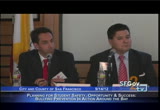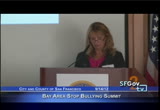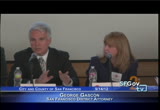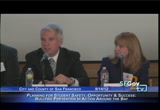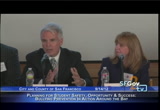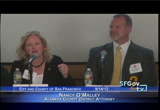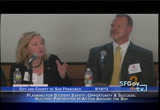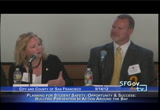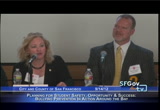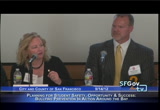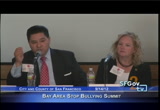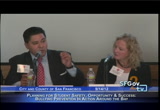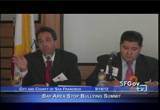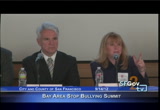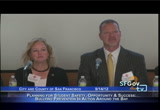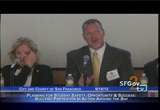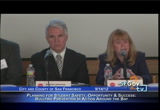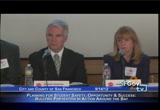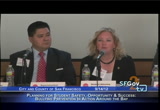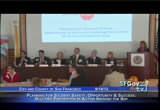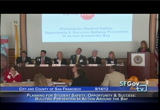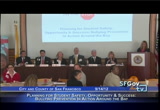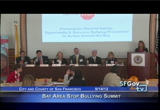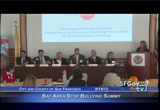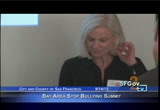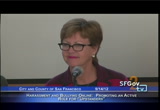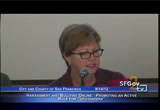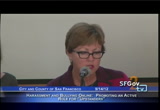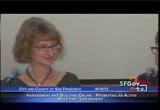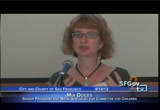tv [untitled] December 20, 2012 5:00am-5:30am PST
5:00 am
schools, so for example research showed that the social attitudes within a particular setting and the community and the parents can manifest themselves in terms of who folks are picking out to target; right? so for example at maybe a high end school like lowell ore gunn you might have bullying because you're not taking enough ap class. i have heard this and there is so mush pressure and criticized by the peers if they're not smart enough. in other schools it's the opposite and bullied because they are smart when that is not the krult. maybe in texas where it's a different culture that we saw in the movie that perhaps football is everything and if a child isn't good at sports they're an outcast. i would
5:01 am
like to ask how or if addressing the cultural needs at each school how can we -- is this all one way of doing this, or do you feel there are different needs in different communities? and i think perhaps the law enforcement folks feel the cultures in the communities and see that come out in the adults. i would like to hear about how do you affect a culture and even in san francisco we have many cultures affecting what is valued, what is criticized. >> you know i think that richard touched upon this. it's a relationship of power and it's clearly going to differ from community to community; right. when i was telling you i was picked because because i didn't speak english or at all initially there were only about
5:02 am
5% of us that were hispanic in the school and wouldn't be the case if 95% are hispanic and english speaking as a second language, but i think the way that we can deal with the issue is we ought to first of all start with the notion of respect for others, and respect for others can work across the line. it doesn't necessarily mean -- it doesn'tly has to deal with the culture. is how we treat one another? and i think we have to be very clear in our educational process and the communication to our people and what is acceptable behavior and what is unacceptable behavior, and i am often fearful when we try to develop a black letter law if you have all these factors and bullying and you fell outside and that works okay in the courtroom. right? as prosecutors we need clear understanding of the laws to understand whether we have a criminal violation or not, but
5:03 am
i am fearful we maybe overly legalistic and the way we deal with on a daily basis and we need to approach this by a global perspective respecting people and understanding we have the same rights and obligations and starting with the adults and i go back to the adults because the adults really have to tow the line here. they really have to walk the talk. i cannot tell you how often i of involved in large mentoring efforts and now in two different places, in l.a. and arizona. i cannot tell you how often the teachers are the ones that set the tone whether we have a respectable environment or and not part of that is education and we have to educate the adults that spend time with the kids and the federal government will come up with the giens and 37 factors or 40 and frankly most of us won't
5:04 am
remember and unless we're prosecuting and looking for the elements of the crime and whether we're going to file a case or not. i i think we need to be more global than this and this works and we need to illustrate the things that aren't acceptable? what is the impact on the victim? what is the impact on everyone else? and working together to solve the problem. >> nancy. >> in some school districts and teachers when i brought up this issue i get back "you're not going to change kids being kids. some kids will pick on other kids and in the dynamic girls will be friends today and the queen bee will turn away from some girl and the enemy today and tomorrow it's somebody else, and again i agree with george and so much of this is the responsibilities falls on those adults who actually have a
5:05 am
bird's eye ore worm's eye view of what is going on in the schools and the kids' lives and when kids don't show up for school and do more inquiry we find there is an issue around sexual harassment in the school and another form of bullying and girls assaulted or harassed in an aggressive way, or and it just goes higher and higher. our teachers need to be not only recognize what they're seeing but willing to look at what they're seeing and one of the unfortunate things we have seen with some teachers and i am not criticizing the teachers in general because i think this is a learning process for adults also to move from kids will be kids and we had someone who was mean to us in school to actual bullying, but we have talked to the school districts around the state and sometimes the teachers
5:06 am
have the blind's eye and it's more work to get involved and more work and what do relationships look like, and i agree with tony this is the beginning of relationship building, or it's a relationship going bad that could get worse. and so i think that we have a lot of educating to do. in my office we do a lot of cyber bullying training in our schools and it's amazing how much access some kids have to the internet at a really young age. they have iphones. they're on the internet. they have or smartphones. they have computers in the bedroom and parent it is never over the shoulder to see what is going online. there is a lot of unrestricted access to the internet and the internet has put it on another level and one
5:07 am
push of a button and everybody in the school will have a picture or hear it and the outcome of that is -- it would be not just reconciling relationships or restorative justice or some other way between two or three or four people but now you have a whole study body that has been tempered or tainted with something that goes against the individual who was a target of that, so the internet working more strongly with the partners and the providers of the internet and there is awareness and education, but back to the student assemblies that we do it is amazing at the end of the assemblies how many kids will step forward quietly or privately "it happened to me. it happened on the internet. this person put something out about me" and didn't feel they had a place to go so there
5:08 am
could be intervention so i think the partnership between law enforcement and between the schools and the school resource officers is critically important. we have prosecuted parents by the way who have encouraged their children to bully in a dramatic way. we prosecuted a mother who forced the 14 year old daughter to bully a 12 year old and resulted in the 14 year old physically attacking the girl with the mother screaming at her if she didn't continue to beat the kid she was going to get beaten and the kids watching were filming it on their smartphones and that girl -- the daughter was also a victim of bullying by her own mother and i think this is a place where law enforcement can step in and hold parents accountable and doing things aggressive or against the law and encourage the kids to do
5:09 am
something against the law and getting the parent's intention and bring them in on some level. >> quickly i want to say something about this. i appreciate what you have said about the adults and the adults having responsibility but i'm going to speak practical callity. i have been a teacher and principal in different states. i want you to think about to the time after columbine and think what happened after that incident happened. there was a wave to put metal detectors in schools and all of this security. i will tell you folks in two different schools and having confiscated many weapons it wasn't a metal detector that brought it to my attention. it was a student. they were the most effective because they're
5:10 am
ubiquitous. they are everywhere. they know who has what in the backpack and if you extrapolate that to bullying we can't be at home when they are logging in. students will know who posted what and if we can build the resiliency in the student body and move from the paradigm where it's okay to post those things and you're a big guy because you have a picture of a naked teeneen on your phone and to a culture it's not scpook you're hurting somebody and somebody will bring that to the attention of an adult that can intercede. i think that is what we're trying to develop and system and students understand it's not okay to hurt each other and whether it's words or pictures. that can only happen with what george and nancy were talking about and empowering teachers and administrators and parents to be part of that conversation as well. >> thanks richard.
5:11 am
>> i want to add -- >> really fast. >> thank god there are people that want to teach in our schools and i think it's a tremendously difficult and challenging job and as res lynn was talking about when you have the five minutes passing in the hall and you see bullying so you have a few choices. i would like to go to the bathroom. i can do this. i can do that, or am i going to get involved in this situation? and to give some strength to encourage teachers to do this, there was a law passed recently. assembly bill nine and amends the education code and requires school personnel, whether it's teachers or administrators if they see something that looks bullying they are required to intervene when it's safe and appropriate to do so, i think it's the kind of law that is
5:12 am
trying to give teachers -- yeah, you are the authority figure. you are supposed to do this and we will support your efforts. assembly bill nine and amends the education code and it's just something that might be useful for the school personnel here. >> okay. we have time for just a couple of questions but before that i'm going to ask you a panel and you only get three words to answer. i'm going to cut you off. you can use one word. money is a problem in terms of programs. if you had all the money in the world what would you do to combat bullying? >> kids, empower, empower kids. >> okay. can specific. >> education and prevention.
5:13 am
>> restorative justice and healing. >> that's too many words. nancy. >> healing and intervengdz. >> developing deep relationships. >> strengthening families. >> excellent. [applause] thank you to the panelists. we have time for about two questions. >> hi to the panel and thank you very much. really interesting. i am jack winestein and admitted have a vested interest where you might take this question. i think that what you have done collectively today and especially in this last panel is make a case for more professional development for educators as well as for opportunities for students to develop their moral philosophical voices, so the question i have for you given the current climate,
5:14 am
economically and politically, can we afford to separate out this conversation from the larger political and economic conversation that confronts the whole state? and what's the role of this body, educators community leaders in making sure we fund the kind of interventions and developments that lead to division you have described so beautifully. >> can i get one person to answer that? >> real quick. i think the idea that we can help young people and dawlts learn and growth mind set and have to advocate for more time to learn. the reduction in adult learning in schools is damaging all of us as a whole entire state, so i think you're absolutely right, but to then also understand that helping young people have a social filter, executive function and make life's choices. we know about brain
5:15 am
development but we can help young people to make good decisions and we stripped that out and doesn't incorporate that and social emotional learning and other folks to say we should in fact care deeply about young people developing the capacity to make good decisions and to struggle productively with one another. that should be our teaching as well so more time for adults to grow and learn together and professional capital to build and help the kids grow and not just the content but in human beings. >> yeah and to add to that i think it's involving the community, so the pta's, the nonprofits, the faith based community and bringing them together and share resources and get really focused and looking at the data and then the outcomes because that keeps you focused. >> great. okay go ahead. >> this is a mixed appreciation and a question. i'm nicholas
5:16 am
carlyle and the director of "bully" , san francisco's nonprofit and we share with you the realization that punishment makes bullying situations worse. it's uncoupled bullying and punishment and the question is, which is kind of a comment too. if we uncouple bullying and punishment doesn't that make it much easier to define what bullying is? and seems to me and defining bullying because the bar is so high because we're afraid it's going to trigger some prescribed consequence and bullying doesn't necessarily have to lead to a consequence and just a solution wouldn't that make the definition of bullying much easier? >> i don't think that that -- at least from my perspective and
5:17 am
what i heard so far that the focus of addressing bullying leads to punishment. at least what i have been talking about and my colleagues here is we're focused on addressing it as changing behaviors, and learned positive behaviors as opposed to trying to assess or attach a punishment to it. it might result in some punishment if it's extreme but i think that the focus at least from us is that we want to do the intervention, the healing, the retorstiff justice and i don't think punishment should be a substiewlt word for the behavior and i think that is where the confusion lies for some and if we held someone accountable for
5:18 am
a behavior is attached to a punishment and not necessarily so. >> great. i would like to recognize the district attorney of nasessa and gary leeberson. is he here? hi gary and the other district attorney. if we can get a microphone and since we have the experts here. what are you most proud of in san that -- mateo and i know there is a program there and what you're most proud of in your community that addresses these issues? >> hi everybody. >> sorry to surprise you. >> no worries. we're meant to think on our feet. the collaboration that we have in our community. we have been sitting around the table as community leaders throughout our criminal justice system for a number of years, long before
5:19 am
realignment happened with the schools and law enforcement, with probation, our office, with public centers office and looking a sulsystem's approach and not just punitive base but there are going to be consequences as nancy said for very extreme acts but everything ultimately is local. i mean with limited exceptions of people that need lifelong time outs or much longer than everybody else, but by in large everything is local and i think that we really put a lot of focus on our young people. my colleagues and the superintendent was here barbara and had to leave about an hour ago and we try to work together. we have been trying to be innovative in truancy areas. i think i stole this from alameda and san francisco but i sent a letter out to address all school
5:20 am
parents on my letterhead to talk about the importance of kids being in school and sort of the having the feather in the club approach but basically talking statistically today's victims being tomorrow's victims and perpetrators and how important it is for your kids to be in school, so it's the full community approach and the holistic approach as it were. >> okay great. did you want to add something? >> on the spot but i was proud of the three da's and they covered it and we worked over the years with the heart power that jeff rosen referred to. when moving into the soft power i recognize we're not experts so i look to people like anne campbell, our superintendent and to cheryl there to educate us
5:21 am
and i said this morning "i am interested what we can do as a district attorney's office to help , what we can do to help" because we recognize we're not experts. we have an expertise in certain areas dealing with consequences and accountability and we're good with that. when it comes to soft power with great collaboration we can have a support role and provide to our educators and experts what exactly can we do to assist you getting to the end that everybody talked about today and that's the only different take we would have. >> great thank you. [applause] i would like to say we need to wrap up. we have a late start and need to keep moving. i would like to say what struck me today that even though teachers and principals are in school all
5:22 am
day addressing those things in the hallways and they're not here. we have school people but they're not the ones on the ground but i think they would be thrilled to know that the people in this room that represent law enforcement -- i think i saw someone from the cartoon network and parents and people across the board recognize this isn't just a school problem. this is a community problem and that everybody is here to work together in that, and what a wonderful message to send to those teachers even though they're not here today. i want to thank the panelists that represent the groups. these are my sources and often don't like me and today we will be friends and create a culture of cooperation. thank you so much. [applause]
5:23 am
5:24 am
we get started and i know everybody needs to go but again it's an important top and i can flowed through many of the conversations today and harassment and bullying online and i will introduce the moderator and she is anne collier and executive director of family news and a journal iftd and youth advocate and the coauthor of a parent's guide to facebook and myspace unraveled and social networking. she served on president obama technology working group and delivered its group to congress and youth safety on the internet and you can read her plug. how's that for a plug? >> thank you very much. our parents guide is free and can be distributed at schools or
5:25 am
parent nights or whatever, so we're happy to make them available to you at connect safety .org so a little bit more of the big picture. this is amazing panel of people who have resources and campaigns that can support and reinforce your fine work. so i am glad you stayedand we learned about bullying and preventions and solutions and just to reinforce getting the accurate picture bullying is a serious problem but it's not an epidemic. it's not on the rise. daift finkelhorn and director of the research center university of new hampshire and reviewed studies and bullying among
5:26 am
youth is actually down in recent years. his colleague have actually stopped using the term of "bullying" and refer to peer aggression and i can go into definitions but i won't bore you. a subset of bullying is also not on the rise and based on researchers and their samples and other scholar's work and 20% of teens have ever experienced cyber bullying and a scholar from norway published lower numbers but why be such a stickler about accurate data? because the norms for research say getting the facts out takes
5:27 am
the tacit acceptance or fatalism out of the picture. perception changes behavior so when we connect surveys in school and own their own data and a psychology professor at university of nebraska and the vast majority of students moment engage in bullying behavior and when students find that out bullying behavior goes down further and it's a powerful resource you can use. now i'm going to introduce this amazing panel. first we have just to my right mia from sealtion. she is going to explain more about this term that was used a lot today and social literacy or social
5:28 am
emotional learning. alice con is from cartoon network. dave steer to her right is from facebook and next to him is officer holly lawrence, sunny valley of public safety, digital safety program and she's going to talk about which is a powerful thing going national. and next -- is brian here? no. okay. all right. so we're all set and mia i would like you to enlighten us more in all that you're doing in social emotional learning. >> sure. i had some slides but i'm not sure -- no, we have a handout that went around to you and more detail about what social emotional learning is because i think we rise a little bit today and i came from seattle and i know many people have brought up that term today
5:29 am
and i get the sense from this group that you're at kind of a high level of discourse and you have a general understanding. could i see a show of hands for those of you that social emotional learning is a familiar term? and those that feel you have a deep understanding of it? okay. great. thank you. i want to introduce myself a little more so you have the context of what i do. i work for a nonprofit in seattle "committee for children" and we have been around for about 32 years. we're nonprofit and we do both education and advocacy and on the education end we develop be curriculum and the curriculum is used widely across the country. it's in every state in the country and in canada and 70 countries around the world and programs we're familiar with is second st
56 Views
IN COLLECTIONS
SFGTV2: San Francisco Government Television Television Archive
Television Archive  Television Archive News Search Service
Television Archive News Search Service 
Uploaded by TV Archive on

 Live Music Archive
Live Music Archive Librivox Free Audio
Librivox Free Audio Metropolitan Museum
Metropolitan Museum Cleveland Museum of Art
Cleveland Museum of Art Internet Arcade
Internet Arcade Console Living Room
Console Living Room Books to Borrow
Books to Borrow Open Library
Open Library TV News
TV News Understanding 9/11
Understanding 9/11